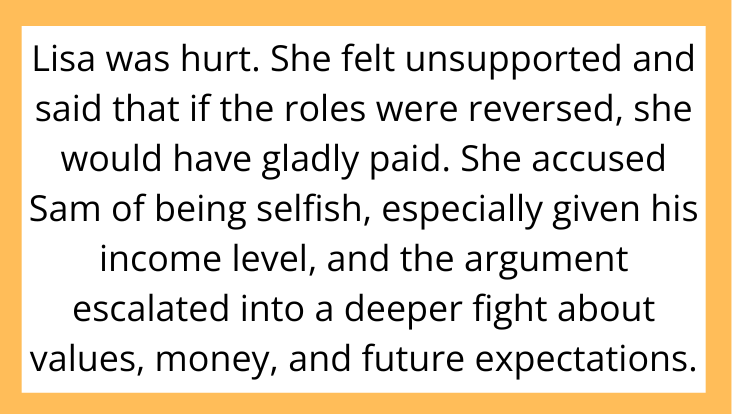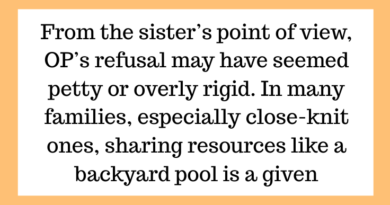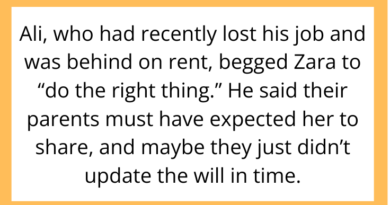AITAH for Not Paying for My Girlfriend’s Cosmetic Surgery Even Though I Can Afford It?
Relationships often involve compromise, support, and generosity—but where do we draw the line between partnership and obligation? In today’s AITAH scenario, a man with financial stability refuses to fund his girlfriend’s elective cosmetic procedure, sparking a heated debate about fairness, body image, and financial boundaries.
The Backstory: Money Meets Insecurity

A 34-year-old man—we’ll call him Sam—shared on r/AITAH that he earns a comfortable six-figure income working in tech. His girlfriend, Lisa, 29, works in education and earns considerably less. The two have been dating for over three years and live together in an apartment Sam primarily pays for.
Recently, Lisa opened up about her insecurity with her nose and expressed her desire to get a rhinoplasty. She’d been saving for over a year but was still short about $6,000. She asked Sam if he would cover the remaining cost as a “gift,” emphasizing how much it would mean to her confidence and self-esteem.
Sam declined.
Sam’s Reasoning: “I Don’t Want to Pay for Surgery I Don’t Think Is Necessary”

Sam told Lisa that while he supports her emotionally, he doesn’t feel comfortable spending thousands on a cosmetic procedure he doesn’t believe she needs. He says he loves the way she looks and doesn’t think surgery is necessary. He offered to support her through the process and recovery if she continued saving and paid for it herself, but he didn’t want to financially contribute.
Lisa was hurt. She felt unsupported and said that if the roles were reversed, she would have gladly paid. She accused Sam of being selfish, especially given his income level, and the argument escalated into a deeper fight about values, money, and future expectations.
Sam turned to Reddit: AITAH for refusing to pay for my girlfriend’s cosmetic surgery even though I could easily afford it?
Financial Independence vs. Emotional Support

Why Some Say Sam Is Not the Villain
Many commenters on Reddit agreed with Sam’s stance. Here’s why:
-
Personal Finances Are Personal Choices: Just because someone can afford something doesn’t mean they are obligated to pay for it—especially for something elective and not medically necessary.
-
Setting Boundaries Is Healthy: Sam isn’t telling Lisa she can’t get the surgery—he’s just choosing not to fund it.
-
Avoiding Precedents: Some users warned that paying for this could open the door to future expectations: what about Botox, fillers, or other non-essential costs?
One top comment summed it up: “You’re not her ATM. You’re allowed to love her and support her without paying for everything she wants.”
Why Others Think Sam May Be in the Wrong
That said, a solid portion of users felt Sam’s refusal was a bit cold, especially considering his financial position.
-
Support in a Relationship Isn’t Just Emotional: For some, supporting your partner means helping them achieve goals that matter to them—even if you don’t personally value those goals.
-
She’s Not Asking for Luxury, She’s Asking for Self-Esteem: Lisa isn’t requesting a vacation or shopping spree—she’s seeking something she believes will help her confidence.
-
Power Imbalance: When one partner makes significantly more money, refusing to help with something meaningful can feel like a power play.
“It’s not about the nose—it’s about whether he values what matters to her,” one Redditor noted.
The Real Conflict: Values, Not Just Money

At its core, this isn’t just about surgery or money—it’s about alignment.
Lisa sees Sam’s refusal as a lack of emotional investment. Sam sees her request as a financial overreach. These moments reveal mismatched expectations, which are often the start of bigger relationship issues.
Whether it’s about paying for surgery, supporting a dream, or backing a career change, couples often face these financial crossroads. And how they navigate them says a lot about their compatibility.
What Could They Have Done Differently?

For Sam:
-
He could have softened his response by validating Lisa’s feelings first.
-
A compromise, like a partial contribution or helping her find a payment plan, might have felt more supportive.
-
Initiating a broader conversation about shared finances and expectations could help avoid future clashes.
For Lisa:
-
She could try to understand that Sam’s refusal wasn’t a rejection of her, but of a purchase.
-
Instead of demanding the money, she might have opened the conversation with curiosity: “Would you be willing to help me with this?”
-
Reflecting on whether self-worth is being placed too heavily on appearance could lead to more empowerment.
Conclusion: Not Every “No” Makes You the Villain

In relationships, one person’s “reasonable boundary” can feel like a betrayal to the other. Sam may not be the villain—but neither is Lisa for feeling disappointed.
It’s not about who’s right. It’s about whether two people are on the same page when it comes to money, values, and emotional support.



